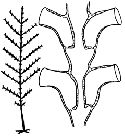RAS taxon details
Syntheciidae Marktanner-Turneretscher, 1890
- Genus Hincksella Billard, 1918
marine, brackish, fresh, terrestrial
recent only
Marktanner-Turneretscher, G. 1890. Hydroiden des K. & K. Naturhistorischen Hofmuseums. - Annalen des K. K. Naturhistorischen Hofmuseums 5: 195-286., available online at https://www.biodiversitylibrary.org/page/4047029 [details]
Schuchert, P.; Choong, H.; Galea, H.; Hoeksema, B.; Lindsay, D.; Manko, M.; Pica, D. (2025). World Hydrozoa Database. Syntheciidae Marktanner-Turneretscher, 1890. Accessed through: RAS (Eds.) (2025) Register of Antarctic Species at: https://ras.biodiversity.aq/aphia.php?p=taxdetails&id=22963 on 2025-09-12
RAS (Eds.) (2025). Register of Antarctic Species. Syntheciidae Marktanner-Turneretscher, 1890. Accessed at: https://ras.biodiversity.aq/aphia.php/aphia.php?p=taxdetails&id=22963 on 2025-09-12
Date
action
by
2004-12-21 15:54:05Z
created
db_admin
original description
Marktanner-Turneretscher, G. 1890. Hydroiden des K. & K. Naturhistorischen Hofmuseums. - Annalen des K. K. Naturhistorischen Hofmuseums 5: 195-286., available online at https://www.biodiversitylibrary.org/page/4047029 [details]
context source (Hexacorallia) Fautin, Daphne G. (2013). Hexacorallians of the World. (look up in IMIS) [details]
additional source Costello, M.J., C. Emblow & R. White (EdS.). (2001). European register of marine species: a check-list of the marine species in Europe and a bibliography of guides to their identification. <em>Collection Patrimoines Naturels, 50. Muséum national d'Histoire Naturelle: Paris, France.</em> 463 pp. (look up in IMIS) [details]
additional source Watson, J. E. (2000). Hydroids (Hydrozoa: Leptothecatae) from the Beagle Gulf and Darwin Harbour, northern Australia. <em>The Beagle, Records of the Museums and Art Galleries of the Northern Territory.</em> 16: 1-82.
note: revision of family [details] Available for editors
context source (Hexacorallia) Fautin, Daphne G. (2013). Hexacorallians of the World. (look up in IMIS) [details]
additional source Costello, M.J., C. Emblow & R. White (EdS.). (2001). European register of marine species: a check-list of the marine species in Europe and a bibliography of guides to their identification. <em>Collection Patrimoines Naturels, 50. Muséum national d'Histoire Naturelle: Paris, France.</em> 463 pp. (look up in IMIS) [details]
additional source Watson, J. E. (2000). Hydroids (Hydrozoa: Leptothecatae) from the Beagle Gulf and Darwin Harbour, northern Australia. <em>The Beagle, Records of the Museums and Art Galleries of the Northern Territory.</em> 16: 1-82.
note: revision of family [details] Available for editors
